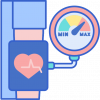Type 2 diabetes
What is type 2 diabetes?
Type 2 diabetes, the most common form of diabetes worldwide, is a chronic condition that affects the way your body metabolizes sugar (glucose) — an important source of fuel for your body. It is a combination of ineffective insulin and not enough insulin.
Type 2 diabetes develops over a long period of time (a matter of years). During this period of time insulin resistance starts, insulin is increasingly ineffective at managing the blood glucose levels. As a result, the pancreas responds by producing greater and greater amounts of insulin, to try and achieve some degree of management of the blood glucose levels.
Insulin overproduction over a very long period of time eventually tires out the insulin producing cells in the pancreas. So, by the time someone is diagnosed with type 2 diabetes, they have lost 50 – 70% of their insulin producing cells.
Risk factors
About 90% of people with diabetes have type 2 diabetes. It can come slowly, usually over the age of 40. The signs may not be obvious, sometimes there may be no signs at all and diabetes is discovered at an advanced stage of the disease. That’s why it is very important to know the risk factors so that you take action as soon as possible.












Preventing type 2 diabetes
Diabetes can cause serious health problems, such as heart disease, stroke, and eye and foot problems. Prediabetes also can cause health problems. The good news is that type 2 diabetes can be delayed or even prevented.
Here are some things you can do to slow or stop the progression to diabetes:
- Lose weight – If you’re overweight, losing 5 to 10 percent of your body weight can reduce the risk of diabetes. Remember it is a process. Work to find helpful tips and a management plan that suits you best so you can stick to it on the long-term.
- Get moving – Aim for a minimum of 30-60 minutes of moderate physical activity, or 15-30 minutes of intensive activity, daily if possible. Start slowly to build up to your goal and always check with your doctor about the most suitable activity.
- Eat healthy foods – Foods lower in fat and calories and higher in fiber are your best allies. Focus on fruits, vegetables and whole grains. Stay hydrated by choosing water over sweetened beverages.
Sometimes medication is an option as well (e.g. Metformin). However even if you take medication, healthy lifestyle choices remain essential for preventing or managing diabetes. Always seek the advice of a qualified professional healthcare provider.




